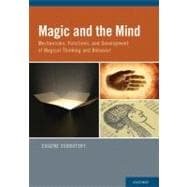
Note: Supplemental materials are not guaranteed with Rental or Used book purchases.
Purchase Benefits
What is included with this book?
| Preface | p. ix |
| Magical Reality | p. 3 |
| Magical Causation: Mind Over Matter and Mind Over Mind | p. 5 |
| Magical Thinking, Magical Beliefs, Magical Behavior, and Other Constructs | p. 7 |
| The Science of Magic and the Magic of Science | p. 8 |
| Magic and Religion: Institutionalized and Noninstitutionalized Magical Beliefs | p. 12 |
| The State of the Problem | p. 13 |
| Hypotheses and Predictions | p. 14 |
| Children and Magic | p. 18 |
| Children's Magical Behavior: A Belief or a Misunderstanding? | p. 20 |
| When Magic Meets Science: Can Children Believe Both? | p. 21 |
| Verbal Magical Beliefs and Children's Everyday Experience | p. 24 |
| Magic as an Anomalous Experience | p. 24 |
| The Belief in Question: Testing the Entrenchment of Magical Beliefs | p. 27 |
| Magical Thinking and Children's Cognitive Development | p. 34 |
| Does Magic Play a Role? | p. 34 |
| Magical Thinking and Creativity: The Study | p. 37 |
| Beyond Childhood | p. 45 |
| Magic Without Magic: Adults' Reactions to Counterintuitive Physical Events | p. 46 |
| The Spectrum of Magical Phenomena: Evidence From Anthropology, Psychology, and Psychopathology | p. 48 |
| Bringing Magical Beliefs to the Surface: The Role of Cost | p. 51 |
| Culture and Magical Thinking | p. 54 |
| Preaching Science and Practicing Magic: A Sandwich of Beliefs | p. 55 |
| Belief in Science: How Deep Under the Skin? | p. 56 |
| A Magical Bridge Across the Atlantic: From Mexico to Britain | p. 57 |
| Uses and Misuses of Magical Beliefs | p. 60 |
| Magic and Exploratory Behavior | p. 63 |
| Weird but Interesting: Curiosity Toward the Supernatural | p. 64 |
| Magical Versus Counterintuitive Physical: The M/CP Effect | p. 65 |
| Magical Thinking and Imagination | p. 79 |
| Are Mental Objects Permanent? | p. 80 |
| Physical Versus Fictional: Domains of Imaginary Reality | p. 81 |
| Can Magical Suggestion Change Imagination? Mind-Over-Mind Magic | p. 82 |
| Turning a Rabbit Into a Fish: The Mind-Over-Mind Magic Experiment | p. 84 |
| Cursing One's Future: Magic and Personal Destiny | p. 91 |
| Magic and Human Communication | p. 96 |
| Magical and Ordinary Suggestion: Are They Close Relatives? | p. 97 |
| The Mechanism of Magical Influence: Participation | p. 98 |
| Communicative Magic: The Study | p. 99 |
| The Magic of Today: Communicative Magic and Indirect Persuasion Techniques | p. 110 |
| Magical Beliefs and Psychological Defense | p. 115 |
| Alliance Against Magic: Science and Religion | p. 116 |
| Now It's There, Now It Isn't: Cognitive Defense Against Magical Intervention | p. 118 |
| Seeing Bad Dreams: Magical Influence and Emotional Defense | p. 121 |
| Magical Thinking and the Mind | p. 132 |
| Two Realities: The Structure of the Mind | p. 134 |
| Functions of Magical Reality | p. 136 |
| Ordinary Reality: The Realm of Science | p. 140 |
| Magical Reality: The Realm of Magic and Religion | p. 144 |
| Existentialization as the Work of the Mind | p. 147 |
| Separating the Magical From the Ordinary: The Developmental Perspective | p. 150 |
| Existentialization and Developmental Research | p. 154 |
| Magical Thinking and Beliefs Across the Lifespan: A Summary | p. 163 |
| Childhood: The Dawn of Magic | p. 163 |
| Adulthood: Magic in Power and Magic in Exile | p. 165 |
| Epilogue: Plunging Into a Utopia | p. 170 |
| Notes | p. 176 |
| Bibliography | p. 181 |
| Index | p. 198 |
| Table of Contents provided by Ingram. All Rights Reserved. |
The New copy of this book will include any supplemental materials advertised. Please check the title of the book to determine if it should include any access cards, study guides, lab manuals, CDs, etc.
The Used, Rental and eBook copies of this book are not guaranteed to include any supplemental materials. Typically, only the book itself is included. This is true even if the title states it includes any access cards, study guides, lab manuals, CDs, etc.